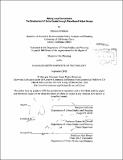Making local connections : the development of social capital through place-based virtual groups
Author(s)
Hulsman, Maryann (Maryann Madeline)
DownloadFull printable version (61.21Mb)
Alternative title
Development of social capital through place-based virtual groups
Other Contributors
Massachusetts Institute of Technology. Dept. of Urban Studies and Planning.
Advisor
Ceasar McDowell.
Terms of use
Metadata
Show full item recordAbstract
Over the last decade, as computer-mediated communication (CMC) has become ubiquitous., place-based virtual groups have become increasingly common in the U.S. People are using various CMC tools, such as email lists, message boards, and social network sites, to form these virtual groups in order to connect with their neighbors and learn about their neighborhoods. While our society's relationship with the idea of neighborhood has become more complicated as our conception of community has become more liberated and less rooted in place, many Americans still want - and benefit from - relationships they form with people they live near. This thesis uses social capital as a lens to investigate whether place-based virtual groups may be supporting community and neighbor social networks in neighborhoods. It focuses on four dimensions of social capital in particular: sense of community. neighboring, citizen participation / civic engagement, and collective efficacy. The author looked at four place-based virtual groups-three neighborhood email discussion lists and one neighborhood Facebook Group-in the San Francisco Bay Area. She interviewed members of the virtual groups and reviewed content from the groups' archives, looking for evidence that the groups were supporting the development of social capital for the individuals who participated in them. This thesis analyzes the experiences of individuals in the groups, assesses each group with respect to how it seems to be supporting the development of social capital, and presents lessons for planners interested in increasing social capital or building community in neighborhoods. The author found evidence that each of the four place-based virtual groups did seem to support the development of sense of community, neighboring, and civic engagement, and that they had the potential to support the development of collective efficacy. However, she also found a lot of variation among the different groups., and the results raise interesting questions about what circumstances might be required to bring about place-based virtual groups that strongly encourage all dimensions of social capital.
Description
Thesis (M.C.P.)--Massachusetts Institute of Technology, Dept. of Urban Studies and Planning, 2012. "September 2012." Cataloged from PDF version of thesis. Includes bibliographical references (p. 145-161).
Date issued
2012Department
Massachusetts Institute of Technology. Department of Urban Studies and PlanningPublisher
Massachusetts Institute of Technology
Keywords
Urban Studies and Planning.